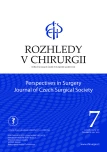-
Medical journals
- Career
Infections associated with vascular reconstruction procedures at the Department of Surgery in Pilsen in retrospect
Authors: B. Čertík; V. Třeška; J. Moláček; R. Šulc; K. Houdek; V. Opatrný
Authors‘ workplace: Chirurgická klinika Fakultní nemocnice Plzeň a Lékařská fakulta Univerzity Karlovy v Plzni
Published in: Rozhl. Chir., 2022, roč. 101, č. 7, s. 318-325.
Category: Original articles
doi: https://doi.org/10.33699/PIS.2022.101.7.318–325Overview
Introduction: Vascular graft infection is a rare but serious complication in vascular surgery, associated with high morbidity and mortality. Early diagnosis of vascular graft infection is important for proper and timely surgical and antibiotic treatment that improves the outcome. The tactic and techniques of surgical treatment of vascular graft infection have changed over the last two decades, and this trend can also be observed in our retrospective study.
Methods: We evaluated a group of patients with prosthetic vascular reconstructions performed at the Department of Surgery, University Hospital in Pilsen in the period of 2003–2021 using retrospective analysis. In the analyzed 19-year period, 23 infected vascular grafts were managed out of a total of 2090 performed peripheral bypasses, and 27 infected vascular grafts were managed out of a total set of 1940 central reconstructions.
Results: The incidence of peripheral vascular graft infections at our Department of Surgery in the period of 2003–2021 reached 1.1% with the early mortality rate of 8.7%; 1.4% central vascular graft infections occurred in the same time period with 33% early mortality.
Conclusion: The results of our retrospective study are comparable virtually in all parameters with the experience of other departments. Consistently, our department switched to in situ replacements for explanted vascular grafts and we can confirm good experience with silver impregnated grafts.
Keywords:
vascular graft infection – silver impregnated graft – arterial allograft
Sources
1. Lyons OTA, Baguneid M, Barwick TD, et al. Diagnosis of aortic graft infection: A case definition by the management of aortic graft infection collaboration (MAGIC). Eur J Vasc Endovasc Surg. 2016 Dec;52(6):758−763 doi.org/10.1016/j.ejvs.2016.09.007.
2. Chakfé N, Diener H, Lejay A. European Society for Vascular Surgery (ESVS) 2020 Clinical practice guidelines on the management of vascular graft and endograft infections. Eur J Vasc Endovasc Surg. 2020 Mar;59(3):339−384. doi:10.1016/j. ejvs.2019.10.016.
3. Folmer EIR, von Meijenfeldt GCI, Scholten RS, et al. A systematic review and meta-analysis of 18 F-fluoro-d-deoxyglucose positron emission tomography interpretation methods in vascular graft and endograft infection. J Vasc Surg. 2020 Dec;72(6):2174−2185. doi:10.1016/j.jvs. 2020.05.06.
4. Bisdas T, Wilhelmi M, Haverich A, et al. Cryopreserved arterial homografts vs silver-coated Dacron grafts for abdominal aortic infections with intraoperative evidence of microorganisms. J Vasc Surg. 2011 May;53(5):1274−1281. doi:10.1016/j.jvs.2010.11.052.
5. Pupka A, Skora J, Janczak D, et al. In situ revascularisation with silver-coated polyester prostheses and arterial homografts in patients with aortic graft infection – a prospective, comparative, single-centre study. Eur J Vasc Endovasc Surg. 2011 Jan;41(1):61−67. doi:10.1016/j.ejvs.2010.10.005.
6. Molacek J, Treska V, Houdek K, et al. Use of a silver-impregnated vascular graft: Single-center experience. Antibiotics 2022 Mar;11(3):386. doi:10.3390/antibiotics11030386.
7. Šebesta P, Štádler P, Šedivý P, et al. Radikální operace infekce cévní protézy v aortofemorální pozici pomocí čerstvého tepenního alograftu: naše střednědobé zkušenosti. Rozhl Chir. 2011Jan;90(1):4−13.
8. Touma J, Cochennec F, Parisot J, et al. In situ reconstruction in native and prosthetic aortic infections using cryopreserved arterial allografts. Eur J Vasc Endovasc Surg. 2014 Sep;48(3):292−299. doi:10.1016/j. ejvs.2014.04.023.
9. Kieffer E, Gomes D, Chiche L, et al. Allograft replacement for infrarenal aortic graft infection: early and late results in 179 patients. J Vasc Surg. 2004 May;39(5):1009−1017. doi:10.1016/j.jvs. 2003.12.040.
10. Giglia JG, Ollerenshaw JD, Dawson PE, et al. Cryopreservation prevents arterial allograft dilation. Ann Vasc Surg. 2002 Nov;16(6):762−767. doi: 10.1007/s10016 - 001-0072-1.
11. Gewartowska M, Olszewski WL, Buyanowskaya O, et al. A novel method for long-lasting preservation of arterial grafts. J Surg Res. 2016 Jan;200(1):374−386. doi:10.1016/j.jss. 2015.07.046.
12. Mestres CA, Eduard Quintana E, Tomislav Kopjar T, et al. Twenty-year experience with cryopreserved arterial allografts for vascular infections. Eur J Cardiothorac Surg. 2019 Feb 1;55(2):358−365. doi:10.1093
13. Pallister ZS, Chung J. Femoral vein reconstruction for aortic infections. Vasc Specialist Int. 2021 Mar 31;37(1):4−13. doi:10.5758.
14. Modrall JG, Sadjadi J, Ali AT, et al. Deep vein harvest: predicting need for fasciotomy. J Vasc Surg. 2004 Feb;39(2):387−394. doi:10.1016/j.jvs.2003.10.021.
15. Staffa R, Kříž Z, Vlachovský R, et al. Autogenní vena femoralis superficialis jako náhrada infikované aorto-iliako-femorální cévní protézy. Rozhl Chir. 2010 Jan;89(1):39−44.
Labels
Surgery Orthopaedics Trauma surgery
Article was published inPerspectives in Surgery

2022 Issue 7-
All articles in this issue
- Mikrobiologie v chirurgii
- Diagnosis and treatment of surgical skin and soft tissue infections – current status
- Microbiological analysis of peritoneal fluid samples from patients with perforated peptic ulcer – retrospective observational study
- Infections associated with vascular reconstruction procedures at the Department of Surgery in Pilsen in retrospect
- Laparoscopic repair of perforated peptic ulcer – routine procedure or targeted patient selection?
- Benign stenosis of common bile duct after Roux Y gastrectomy
- Giant aggressive intra-abdominal desmoid-type fibromatosis – case report
- Perspectives in Surgery
- Journal archive
- Current issue
- Online only
- About the journal
Most read in this issue- Diagnosis and treatment of surgical skin and soft tissue infections – current status
- Giant aggressive intra-abdominal desmoid-type fibromatosis – case report
- Laparoscopic repair of perforated peptic ulcer – routine procedure or targeted patient selection?
- Benign stenosis of common bile duct after Roux Y gastrectomy
Login#ADS_BOTTOM_SCRIPTS#Forgotten passwordEnter the email address that you registered with. We will send you instructions on how to set a new password.
- Career

